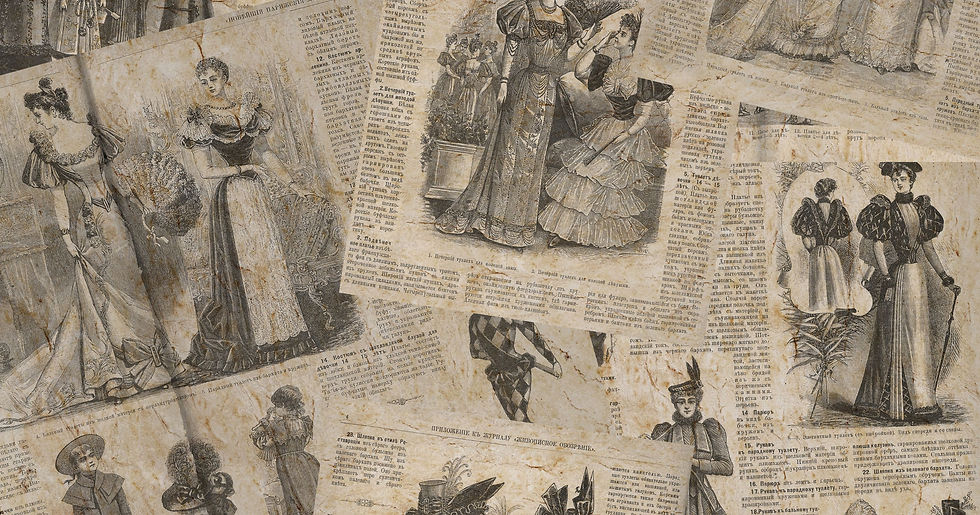The Changing Threads of Fashion and the Need for a New Business Model
- Raffles Jakarta

- Nov 25, 2025
- 4 min read
Updated: Nov 28, 2025

Industry specialists are advocating for a transformative phase characterized by innovation, transparency, and sustainability as the historically resilient "Made in Italy" label encounters unprecedented challenges. The traditional European luxury model, characterized by craftsmanship, exclusivity, and heritage, is currently facing challenges due to shifts in the global economy, evolving consumer values, and the emergence of new digital business ecosystems. A recent report from Euronews indicates that experienced professionals in the fashion industry are cautioning that the Italian fashion system may face a prolonged crisis unless it innovates its production methods and business practices.
Is this the conclusion of a significant period or the beginning of a new chapter?
Gucci, Prada, Valentino, and Dolce & Gabbana represent a selection of prominent brands within the Italian fashion industry, which has consistently set the benchmark for luxury on a global scale. However, the environment surrounding it is evolving. Today's younger consumers expect brands to demonstrate honesty, cultural relevance, and a commitment to environmental sustainability. Fashion transcends mere aesthetics; it now embodies a sense of purpose and narrative.
Contemporary brands such as Jacquemus, Marine Serre, and The Attico demonstrate that adaptability and authenticity can hold greater significance than merely possessing a lengthy legacy. This change compels prominent luxury brands such as Louis Vuitton, Chanel, Hermès, and Balenciaga to reevaluate their communication strategies with contemporary audiences. Many individuals are leveraging digital storytelling, social commerce, and limited-edition collaborations to bridge the past and the present.
The Role of Fashion Marketing and Management
Contemporary fashion marketing transcends mere clothing sales; it focuses on crafting comprehensive brand experiences that engage customers and foster loyalty. Customers seek to establish emotional connections, feel included, and engage with diverse cultures. Digital platforms, such as TikTok and Instagram, have transformed the fashion industry into an interactive culture, seamlessly integrating marketing, management, and creativity.
To maintain a competitive edge, managers must leverage AI-driven analytics, enhance the transparency of their supply chains, and implement omnichannel retail strategies. The McKinsey State of Fashion 2025 report suggests that the upcoming decade will be characterized by brands that effectively integrate data with design, leveraging both technology and human creativity.
Another significant milestone for Raffles Jakarta
Raffles Jakarta: Raffles Jakarta is honored to be the sole finalist representing Southeast Asia at Mittelmoda 2025 in Milan. Christabell Bellini, a fashion design student, distinguished herself as the sole finalist from Southeast Asia at Mittelmoda, The Fashion Award 2025 in Milan, Italy.
Her collection, "Suburbia," draws inspiration from the allure of suburban life in the 1950s, featuring playful shapes, whimsical details, and a compelling narrative voice [Read More Here]. The outcome represents a contemporary resurgence of nostalgia, highlighting creativity, craftsmanship, and individuality, which is making a significant impact in the fashion industry.
Christabell's victory at Mittelmoda not only showcases her exceptional talent but also solidifies Raffles Jakarta's position as a premier fashion institution representing Indonesia and Southeast Asia on the global stage.
Are you curious about how international fashion shows like Mittelmoda and JFW are shaping the future of the creative industry? [Learn More Here.]
For those aspiring to make a significant impact in the fashion industry, click here to receive top-notch guidance from our team of specialists.
An evolving global industry
Transformations are occurring beyond Italy's borders. France's couture houses, Japan's conceptual designers, and Korea's tech-integrated fashion startups are all exploring hybrid models. Established brands such as Burberry, Ferragamo, and Versace are entering the metaverse, creating collections accessible to all, and establishing sustainability objectives.
Indonesia, Thailand, and Vietnam are emerging markets that are influencing the dialogue. The ASEAN region has emerged as one of the fastest-growing fashion markets globally, driven by increased access to technology, the proliferation of influencer culture, and advancements in creative education. Southeast Asia is redefining the concept of "made with authenticity" as local designers gain increased recognition on a global scale.
From Creation to Application
Individuals today seek to engage actively rather than observe. They seek to understand the location, methods, and rationale behind the creation of various items. As a result, brands have been required to implement traceable production methods, adopt circular design systems, and collaborate with communities. Stella McCartney continues to set the standard in sustainable luxury, while Patagonia and Allbirds actively champion environmental activism within the fashion industry.
Brands that integrate purpose with performance, leverage storytelling to inform their strategy, and embrace innovative ideas are poised for success in the future.
Become the Next Fashion Star
Arman POUREISA
Marketing Manager
Raffles Jakarta
References
Aziz, Y. A., & Poureisa, A. (2025). Social commerce dynamics in online retail: Examining Instagram’s design and its technology. International Journal of Technology and Human Interaction (IJTHI), 21(1), 1–31. https://doi.org/10.4018/IJTHI.390210
Euronews. (2025, October 28). Made in Italy no more: Experts want new fashion models as industry crisis looms. https://www.euronews.com/culture/2025/10/28/made-in-italy-no-more-experts-want-new-fashion-models-as-industry-crisis-looms
McKinsey & Company. (2025). The State of Fashion 2025. https://www.mckinsey.com/industries/retail/our-insights/the-state-of-fashion
Business of Fashion. (2025). How fashion’s business model is being rewritten for the next decade. https://www.businessoffashion.com/articles/news-bites/fashion-business-models-2025
Vogue Business. (2025). What luxury brands must do to win Gen Z. https://www.voguebusiness.com/fashion/luxury-brands-gen-z-strategies













Comments